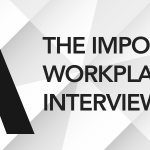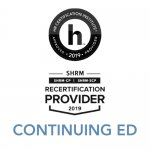
Dropping Knowledge on WZ’s Workplace Investigative Interviewing Strategies for HR/ER Professionals
It has been incredibly fulfilling to watch our HR/ER vertical double in size each year over the past five years. A tsunami of teams seeking training in sensitive areas such as forensic interviewing has been great to experience. 90% of the time, these delicate conversations have absolutely zero to little evidence. I would estimate 60-70% of my personal speaking calendar has been dedicated to working within the HR/ER/Ethics/Legal arena helping various professionals navigate these unique investigations. Without question, an equal percentage of my time when stationary is jumping on conference calls to discuss how we customize this very workshop for teams requesting to bring this program in house. Our clients are frustrated with the onslaught of allegations like, “My boss hates me,” (the definition of “bullying” for some slightly blurry) and “I’m uncomfortable with ______” (fill in the blank – their look, joke, language etc.) scenarios. We modified a program originally designed with our friend Jill Jacquin (psychologist for the USPS) that we were working on for the US Postal Service called I-THREAT (who experienced a few hostile work environment scenarios in their day).
In recognition of of the eight (8) upcoming HRCI & SHRM pre-approved WZ Seminars on Workplace Investigative Interviewing Strategies (kicking off in New York on May 15-16, 2019) below are an equal amount of the most common questions often asked by HR/ER professionals who want to learn more about this exclusive training program.

QUESTION #1 | What do you currently see as the greatest weakness that teams share in handling these hostile work environment investigations?
Hands down – preparation. Tenure within an industry doesn’t necessarily translate into confidence walking into these conversations. At times, it leads to complacency bordering on arrogance. Many have so much on their platter besides investigative interviews, it would be natural to not be able to provide or feel as though they have the necessary amount of time to plan their interview.
“What types of objections will I receive, and am I prepared to handle without hesitating?” (Isn’t it amazing how witty we always are 20 seconds too late)?
“Is the environment or time of day appropriate for a successful conversation?” (Believe it or not, there are times of day and settings that set people up for failure).
“Will I be able to speak with all parties in a timely manner to avoid compromising information and the credibility of the investigation?” (SHRM article on Banner Health Ruling).
During the workshop we explain the significance of preparation work prior to the actual conversation(s) that usually is an instant eye-opener to attendees.

QUESTION #2 | Will this training translate to other areas of responsibility?
Without question. We teach communication methodology, proper question development and structure, listening skills (which are different than hearing skills), physical & verbal recognition, use of empathy during sensitive conversations as well as many other components necessary for mental toughness in the interview room. These skills will translate into coaching, mentoring, onboarding interviews, integrity conversations, pure negotiation, and (for your own entertainment) at home with your teenagers.

QUESTION #3 | Is this workshop just for Human Resources & Employee Relations professionals?
None of our workshops are limited to certain verticals. We have all walks of life request this particular workshop as organizations have learned to lean on professional interviewers for these unique investigative interviews regardless of title. I have personally presented this program for Office of Professional Standards, GC’s, Ethics Officers, AP, LP, Legal Teams, Medical Professionals, Insurance Brokers, Military, Federal Law Enforcement, Gaming Commissioners along with HR & ER professionals on multiple continents. Each of our tenured instructors have catered this material for so many different industries – it’s universal in effectiveness.

QUESTION #4 | How do we ensure the allegation is accurate – will that be covered in this workshop?
The unfortunate truth, is at times, the investigation doesn’t proceed past the complainant. All too often, folks are on their way out the door for numerous reasons, and emotions cause them to bring forward information that isn’t 100% accurate. Attempting to decipher the truthfulness of a complaint can be a difficult task, while also being cautious not to project blame or disbelief on the victim. It’s common to learn early in the investigative process the information brought forward isn’t bullet proof. Teams attending this workshop are going to leave knowing how to interview all parties – victims, witnesses and alleged offenders.

QUESTION #5 | We obviously must speak to the complainant first. Would you speak with witnesses, or the alleged offender next? Does this matter?
WZ teaches both options during this workshop. There will be scenarios where we recommend chatting with a few additional folks prior to sitting down with the alleged offender. There will also be certain scenarios where speaking with the alleged offender directly after the complainant is, in fact, in your best interest. This sounds counterintuitive to many groups until we discuss it in detail. Having options to consider is always better, not to mention how writing two case reports versus twelve (when possible) has it’s benefits.

QUESTION #6 | Can you give me key components that will be a focal point of this workshop?
- The most popular request would be how to improve recognition of body language. We don’t create human lie detectors (although it would be a powerful superpower). There are no absolutes and many factors that alter statistical information on what appears truthful and what does not. Recognizing that it’s possible a complainant, a witness and the alleged all may show the same physical indicators – but mean completely different things. Guilt, anxiety, shame, fear of disbelief could all be triggers for the same behavior.
- The art of empathy during stressful communication is critical for professionals who conduct interviews of all types. Great negotiators know how to make the environment taste good for both parties.
- Handling verbal confrontation during these conversations is covered as well. Those unwilling to be moved to a position of truth often offer a handful of verbal denials. We will prepare attendees for these specific scenarios so that it becomes second nature by the time they go live.
- Proper question development and structure will be covered in detail. There are many styles of questions (Assumptive, Choice, Enticement, Behavioral and Echo to name a handful) that when used during the appropriate psychological state (resistance, evaluation, submission) can be impactful. Likewise, these can be destructive when used in the wrong area.
- Lastly, and more importantly, strategy will be heavily incorporated. Professionals understand in today’s world of being recorded (all too often without consent by the interviewer), that it’s imperative that strategy be utilized to ensure everyone is treated respectfully, consistently and ethically appropriate in order to identify the truth.

QUESTION #7 | Is the WZ Seminar on Workplace Investigative Interviewing Strategies for HR/ER approved for CEU’s?
The WZ Seminar on Workplace Investigative Interviewing Strategies for HR/ER, along with many other training programs available by WZ have met HR Certification Institute’s® (HRCI®) criteria for recertification credit pre-approval. Wicklander-Zulawski & Associates, Inc. is also recognized by SHRM to offer Professional Development Credits (PDC’s) for the SHRM-CPSM or SHRM-SCPSM.
Recertification & Professional Development Credit Hours Awarded for Workplace Investigative Interviewing Strategies: 13.50.

QUESTION #8 | What is the percentage of lecture vs. workshop?
Research has shown that one of the best ways to learn is to do. Our philosophy for retention is three pronged: teach, watch, execute. We build enough time into this two-day workshop to ensure we can explain all these strategies in detail. The participants then watch videos of real cases being conducted by WZ investigators (CFI’s) from organizations who have hired us to assist them with these investigations. The piece de resistance featured in this workshop includes teams of attendees tasked to design an interview, then execute it with the instructor as the “interviewee” working through all the pitfalls that come with first time attempts. It’s become obvious after more than two decades of working with students that execution in teams versus one-on-one in front of the class helps avoid shortness of breath, heart palpitation and potential professional counseling. We want attendees to enjoy themselves while learning.
Training when and where it’s convenient for your team. Contact Brett L. Ward, CFI at bward@-z.com to create a program specific to your culture, policies and objectives. Dozens of references available upon request.
